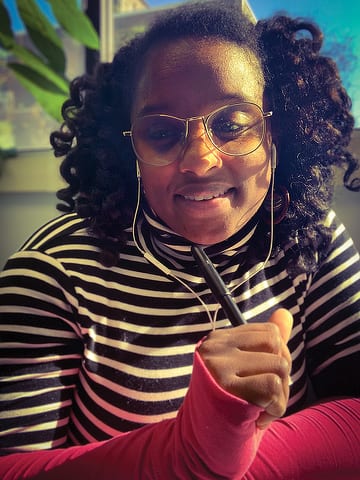As a young, bright-eyed girl, Anya Wallace loved all outlets of art and creativity. Art was Wallace’s outlet to break free from conventional classroom learning.
In fact, this hobby turned into something bigger than she ever imagined.
This month, through March 24, the Art Alliance Gallery Downtown is featuring Reckoning, a show about race. On Monday, an artists’ reception will be held from 7:30 to 9:30 p.m. at the gallery, following ‘Our Roots Run Deep’ — an event featuring youth performances and readings along with short films — from 6 to 7:30 p.m. at Albright-Bethune United Methodist Church.
Wallace, a PhD candidate in art education and women’s studies at Penn State, is one of four women to curate Reckoning. Additionally, Wallace is a visual artist with a concentration in black-and-white photography and paintings.
She’s always believed art can be formed in many ways aside from a conventional painting. Art was instilled in Wallace by her parents and grandfather. Her father was involved in the theater and her mother loved ceramics.
“My mother was crafty and into whatever art form I took interest in,” Wallace says. Even if it was in the kitchen where she and her mother cooked up a delicious meal, it was art in Wallace’s eyes.
Wallace shared a special connection with her grandfather, who passed away when she was 10 years old. He was the first black licensed contractor in Fort Lauderdale, Florida, where Wallace grew up. Much like Wallace, her grandfather loved photography.
“The most fond memory with him was when my cousins and I would play at the park and he always took pictures of us,” Wallace says.
As for school, Wallace was continuously frustrated by the idea of sitting in a classroom, reading assigned books, and learning on deadlines. “Art is much more interesting to me than that,” she says.
Wallace became connected with Mary Lee Kerr, an exhibitor and past organizer of the Artists Take a Stand show at the Art Alliance. Kerr wanted Wallace to be involved with a show regarding race.
“Our role at Art Alliance is to provide a venue for talented artists from Penn State, provide an opportunity for the community to see and appreciate their work, and to offer them some organizing help,” Kerr says.
Wallace was reluctant at first to accept this opportunity.
“No one wants to consider their work to be just about race,” she says. So instead, Wallace took this as an angle for lessons and facilitation for the community.
Reckoning is an exhibit of photography, painting, drawings, multimedia projects, films, performances, and art workshops, all by people of color. The pieces in the exhibit revolve around telling a story of black girlhood as a political force.
Courtney Morris, an artist among the group of four to curate Reckoning, thought of the name for the exhibit.
“Courtney liked the idea of this moment in time to be a reckoning, where we’re all politically and racially accountable,” says Wallace, “and art is a huge part of a political moment; it’s revolutionary.”
Wallace feels Reckoning is a chance to be at the forefront of the conversation and make it what she wants and knows it to be, rather than a flattened idea of race. She believes there is a limited cultural outlet in State College, so by these women coming together with their art, their exhibit will exemplify race in a deeper way.
As for her pieces in Reckoning, she appreciates the aesthetically pleasing process of creating art and showing off how her brain works. “I’m not one to decide for the viewer what my work means, but to rather share my process, as a plea: engage with me,” says Wallace.
Wallace attended Agnes Scott College and received a Bachelor of Arts degree in studio art and Spanish and also studied photography at the Savannah College of Art and Design.
Her love of photography comes from aspiring to visually narrate the stories of black women and girls. Wallace had a story to tell and a journey to walk long before Reckoning.
After working for the Girl Scouts, she worked at the Museum of Contemporary Art in Miami. Soon after, Wallace felt a call to help teach young black girls in the community the meaning of true confidence.
This was the start of Wallace running a program in North Miami called Women on the Rise. This was an educational outreach program that gave girls the tools to learn about topics such as body image and sex.
“Here girls had the freedom to have the conversations they wanted to have, not the conversation they felt they needed to have,” she says, “because it was through art, a place to be open and the narrator of your own story, and they were able to take risks.”
Wallace’s other accomplishments include her master’s thesis called “The Vibrator Project,” which is a creative space aimed toward self-knowledge of young women of color and their perceptions of sexuality.
Wallace’s additional research is centered on social justice, literature, women’s health, social activism, and sexuality among black women and girls.
Reckoning has the potential to open a lot of eyes in the community as a space for learning, and Wallace hopes audiences will enjoy it.
“I think often times conversations and discourses about race imply that people are supposed to be uncomfortable. I think discomfort and tension is important, but with my work being what it is, it’s been challenging but positive to flip that conversation,” she says.
For more information on Reckoning, visit artalliancegallerydowntown.org.



